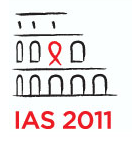Free online resource for treatment decisions without access to genotype resistance tests
1 August 2011. Related: Conference reports, Drug resistance, IAS 6th Rome 2011.
 Simon Collins, HIV i-Base
Simon Collins, HIV i-Base
Results from a new online resource developed to predict treatment outcomes for settings without access to genotypic resistance tests were presented in a poster at the conference. [1]
The system was developed by training computer models to predict virological response to therapy using data from approximately 15,000 treatment changes drawn from over 15 countries. The models use CD4, viral load, treatment history and the drugs in the new regimen in making their predictions and can generate predictions of response at selected time points out to 48 weeks for all available combinations or for a selected combination. The system includes the option to select drugs that are available in each country and to exclude drugs that are contraindicated.
The accuracy of the models was assessed with an independent test set of 800 cases. Two further test sets from Romania (n=39) and South Africa (n=56) were also reported together with subset of 57 cases from the 800 test set that had genotypes available.
The mean area under the curve and overall accuracy were 0.77 and 71% with the 800 test dataset (with similar results during cross validation). The comparable results were 0.68 and 67% for the Romanian and 0.69 and 68% for the South African test sets respectively. When the 57 case test set was used to compare the performance of the models with and without genotype information the results were 0.77 and 74% using the genotype, compared to 0.76 and 68% for the no-genotype models.
The models are now available via the RDIs online treatment selection tool HIV-TRePS. Importantly, the resource includes the option to include, with permission, anonymised information on treatment decisions and outcomes to be collected to help further development of the system. [2]
The resource has been developed by researchers at RDI who were involved in much of the original pioneering work into HIV drug resistance technology and more recently have been developing prediction tools to interpret genotype results using computer-developed neural networks.
Future reports on how this resource is used in practice will be important given the extremely restricted access to resistance testing in most resource-limited countries and that this is unlikely to change in the near future.
References
- Larder BA et al. Predicting response to antiretroviral therapy without a genotype: a treatment tool for resource-limited settings. 16th IAS Conference on HIV Pathogenesis, Treatment and Prevention, 17–20 July 2011, Rome. Poster MOPE146.
- The resource can be accessed free online after one-time free registration.

